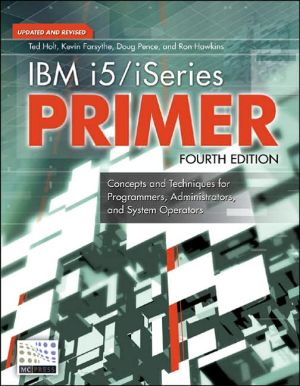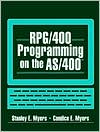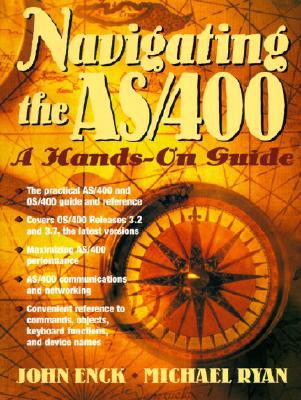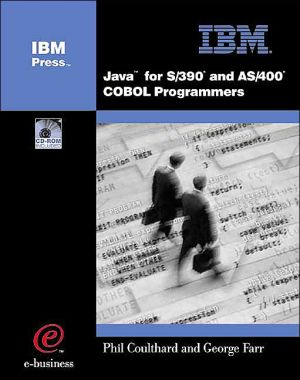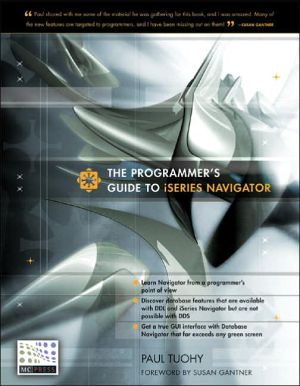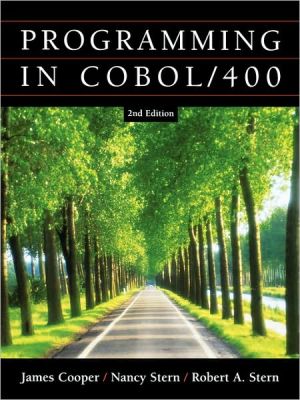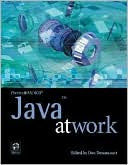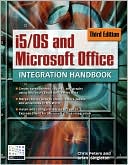AS/400 Expert: Ready-to-Run RPG/400 Techniques
Written for higher-level programmers, this book provides a variety of RPG templates, subroutines, and copy modules that will aid programmers in writing robust and effective RPG/400 programs. The code provided is intended to "plug and play" with existing RPG.\ About the Authors:\ Julian Monypenny is an Application Support Manager for Sears Clothing, Ltd., and a technical editor for NEWS/400. He has programmed on IBM midrange platforms for more than 16 years.\ Roger Pence is the editor of the...
Search in google:
This handbook assumes you already know the basics and will help you get to the next level. It's full of RPG templates, subroutines, copy modules, and interactive programming techniques designed to help you write more effective and robust programs. CD with sample code is intended to "plug and play" with your existing RPG programs or become easily integrated into your new projects. Booknews With 25-plus years of programming experience on IBM midrange platforms between them, the authors of this initial offering in the AS/400 series provide templates, subroutines, copy modules, and other ready- to-run code building blocks (duplicated on the accompanying CD-ROM) for RPG programmers familiar with file feedback areas and primed to upgrade their RPG/400 programs. Appends tips on getting the most from/COPY modules, a string functions test program, and RPG reference specifications. References consist of the and . The graphics evoke dot matrix printer output. Annotation c. by Book News, Inc., Portland, Or.
Chapter 1: If you are like many programmers, RPG is your bread-and-butter language. We'd like you to think of this book as your strawberry jam.\ \ Using This Book: \ Ask any RPG programmer how many programs (s)he ever started from scratch and the answer will universally be, "None." Everybody "borrows" code: code skeletons, /COPY modules, and even old programs, to launch themselves into a new project. We wrote this book to make it easy for you to borrow code. This book contains RPG snippets, routines, subroutines, /COPY modules, and even a little evangelical advice that you can use to write better, faster, and more reliable RPG. Included among the useful offerings here are string-handling routines, error-handling routines, advice for coding API calls, and numeric editing routines.\ We don't spend a lot of time explaining concepts. For example, we include code to harness the power of file I/O feedback areas, but we don't explain those feedback areas. Rather, we assume you are at least conversationally familiar with file feedback areas. For any subject on which you think we moved too fast, check the RPG User Guide (SC09-1348) and the RPG Reference Manual (SC09-1349) for more details about that subject.\ If you are like many AS/400 programmers, RPG is your bread-and-butter language. We'd like you to think of this book as your strawberry jam.\ \ Style Guidelines:\ This book doesn't provide complete RPG programs, so you may wonder why we worry at all about style guidelines. The answer is consistency, reliability, and readability. With this book, our goal is to provide you with a set of "plug-in" RPG routines for use in your programs with a minimum amount of trouble and naming conflicts. Here are the style guidelines we have used throughout the book:\ Because of RPG's naming limitations, each routine or /COPY member's field names start with a specified two-character prefix. During testing and development, this two-character prefix ensured that these field names never conflicted with our test code. Beware, though, that if these prefixes (which are clearly indicated for each routine or member) conflict with naming conventions in your shop, you'll need to change them before you use these routines. None of the routines are very long and those changes, if necessary, will be minimal.\ We make extensive use of /COPY routines. Some RPG programmers don't like doing this (for whatever reason), but for us, the value of a proven routine, which can be used over and over again, is worth whatever trade-off in inconvenience the /COPY method provides. However, if you don't like our /COPY method, simply use the include facility from SEU (or your editor of choice) to copy the member directly into your source code.\ Because the layout of this book limited us to a minimal RPG line width, we don't use right-hand margin comments in our RPG code. You will, though, find full-line comments where necessary.\ Each routine or member includes an abstract that shows what other module dependencies it includes; what field values it expects; what field values it returns; any special requirements the routine or member may have (such as assuming that an F-spec somewhere declared a file feedback I/O data structure name); and what side effects, if any, a routine or member may provide. This abstract also clearly shows the member name (if the code shown is in a member of its own) and the two-character prefix that member's fields use.\ Many of the routines and techniques in this book show example RPG snippets using the appropriate code. These snippets are often abridged samples, not complete programs. We use the colon character (:) in column nine in these snippets to indicate where production RPG code would normally be found.
Chapter 1 Introduction Chapter 2 Effective RPG/400 Error Handling Chapter 3 Gracefully Handling Unexpected Errors Chapter 4 Using the File Information Data Structure Chapter 5 Declaring Data Types Chapter 6 Mapping Externally Described Fields to Array Elements Chapter 7 Sorting Arrays Chapter 8 Searching Arrays Chapter 9 Multidimensional Arrays Chapter 10 Dynamically Determining Keypresses Chapter 11 Getting and Setting the Cursor Position Chapter 12 Using Named Indicators with Interactive Programs Chapter 13 Using a Message Subfile to Display Error Messages Chapter 14 Using Data Structures as Program Parameters Chapter 15 Ending Interactive Programs Automatically Chapter 16 Basic String Operations Chapter 17 Substring and String Concatenation Operations Chapter 18 Justifying and Centering Strings Chapter 19 Searching Strings Chapter 20 Determining the Size of a Field Chapter 21 Editing Numeric Fields Chapter 22 Reformatting Numeric Data Chapter 23 Reformatting Dates Chapter 24 Doing Data Arithmetic Chapter 25 Exponentiation in RPG Chapter 26 Using User Spaces Chapter 27 Using List APIs Chapter 28 File Maintenance Without Record Locks Appendix A Getting the Most from /COPY Appendix B String Functions Test Program Appendix C RPG Reference
\ From Barnes & NobleNever write an RPG program from scratch again! Ready-to-Run RPG/400 Techniques provides a variety of RPG templates, subroutines, and copy modules, sprinkled with evangelical advice, to help you write robust and effective RPG/400 programs. Highlights include string-handling routines, numeric editing routines, date routines, error-handling modules, and tips for using OS/400 APIs with RPG/400. As the first book in The AS/400® Expert Series, Ready-To-Run RPG/400 Techniques is intended for the RPG programmer who wants to write better, faster, and more effective programs. The authors don't spend much time explaining RPG concepts -- they assume a conversational familiarity with them. This book's tested and ready-to-run code building blocks -- provided on the accompanying CD-ROM -- easily snap into existing RPG code and also integrate well with new RPG/400 projects.\ \ \ \ \ BooknewsWith 25-plus years of programming experience on IBM midrange platforms between them, the authors of this initial offering in the AS/400 series provide templates, subroutines, copy modules, and other ready- to-run code building blocks (duplicated on the accompanying CD-ROM) for RPG programmers familiar with file feedback areas and primed to upgrade their RPG/400 programs. Appends tips on getting the most from/COPY modules, a string functions test program, and RPG reference specifications. References consist of the and . The graphics evoke dot matrix printer output. Annotation c. by Book News, Inc., Portland, Or.\ \

